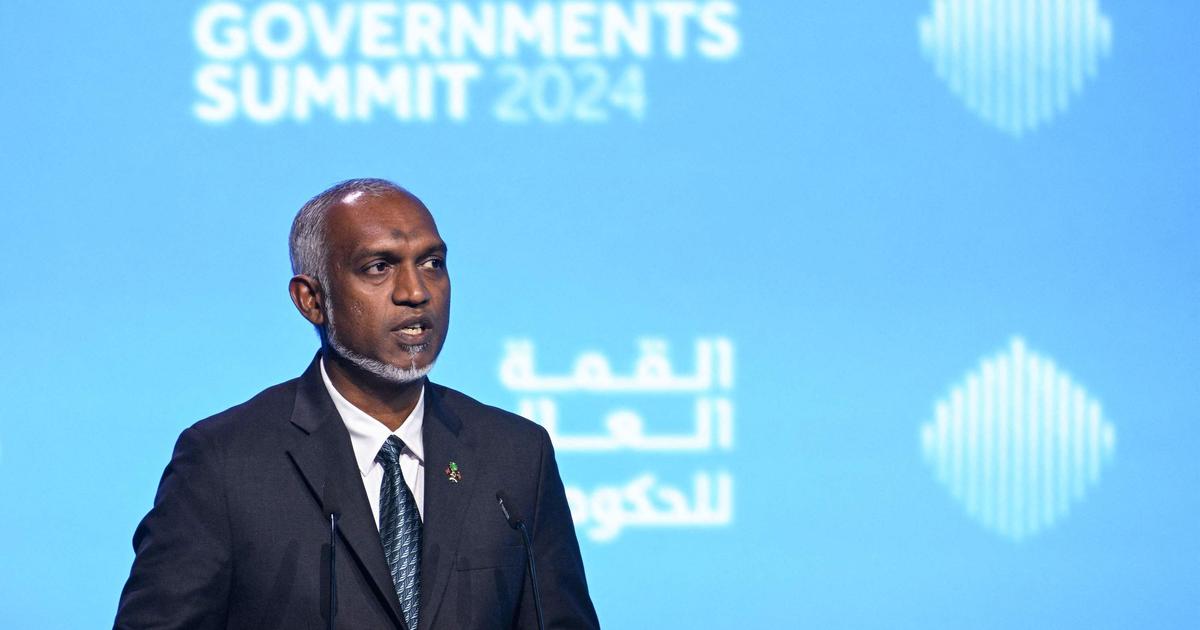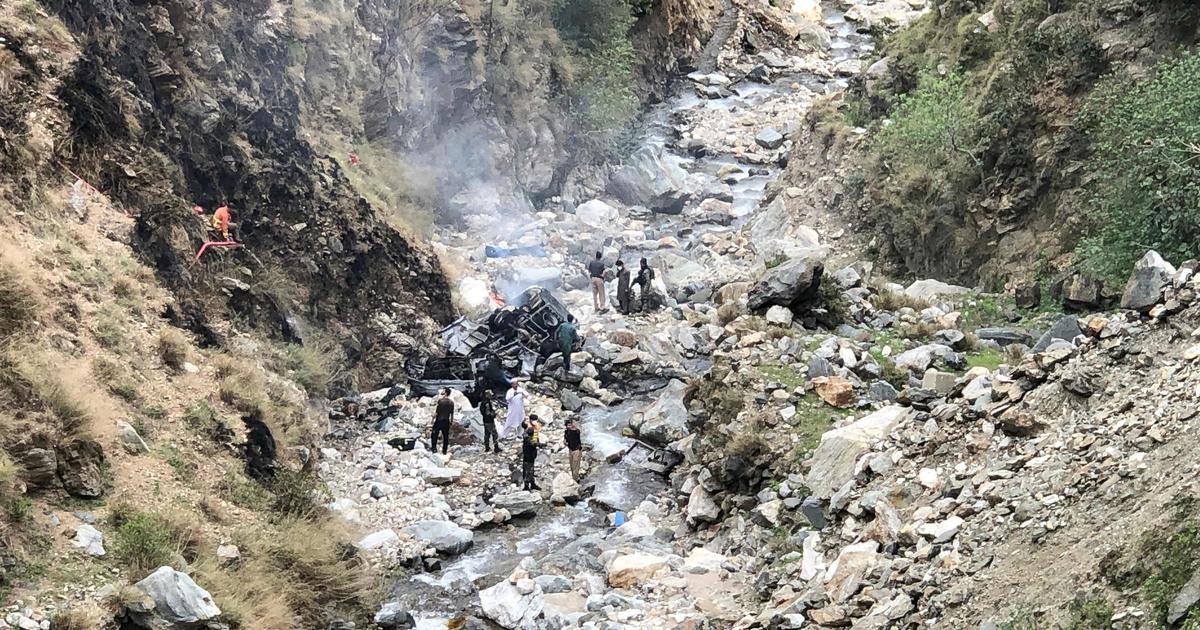Translation introduction:
Pakistan was once a close ally of the United States, but today it enjoys closer relations with Beijing, Washington's fiercest rival.
Pakistan is betting that its engagement with China under the umbrella of the "Belt and Road Initiative" will bring it prosperity and stability, and will spare it a disastrous scenario similar to what happened in Sri Lanka recently.
This is what is discussed in this analysis, published by the American magazine "Foreign Affairs", prepared by "Hussain Haqqani", director of the South and Central Asia region at the "Hudson Institute" and former US ambassador to Pakistan, and "Javed Ahmed", a senior fellow at the Atlantic Council, Non-resident scholar at the Middle East Institute, and former Afghan ambassador to the UAE.
Translation text:
In July of this year, a popular uprising in Sri Lanka toppled the government and sent its president into exile.
This revolution matured on quiet fire for months in the wake of the country's economic collapse, but it nevertheless surprised those who followed Sri Lankan affairs.
In surreal scenes, protesters took over the presidential palace, went down to the palace's swimming pool, dined in his kitchen, roamed his bedrooms, and held skits in his meeting rooms.
These images shocked the struggling economies of South Asian countries, from Dhaka, the capital of Bangladesh, to Islamabad, the capital of Pakistan. Governments in the region looked at the chaos in Colombo and wondered if it would be their turn.
An anti-government protest organized by the Inter-University Student Union, amid the country's economic crisis (Reuters)
This difficult situation has arisen in Sri Lanka due to the collapse of its economy with soaring commodity prices and massive debt crisis.
This situation represents a bitter lesson for the troubled economies that are going through the same conditions, especially those that depend heavily on China, such as Sri Lanka.
Therefore, the Sri Lankan disaster came as an "ear pinch" for Pakistan in particular, as it is highly dependent on Chinese loans.
Pakistan has pinned much of its development hopes on attracting Chinese investments, but despite the high borrowing costs, Pakistani leaders still believe that their country's bet on China is a worthwhile bet.
And if they are proven wrong, the relationship with China risks exposing Pakistan to political turmoil in an already serious economic downturn.
Given the size of Pakistan, there are much more things at stake than there were in Sri Lanka.
Pakistan is home to the fifth largest population in the world and has an economy of $340 billion.
Its economic productivity has fallen in the past six years to unprecedented levels, as domestic revenues and foreign reserves have shrunk, the value of the local currency has plummeted, unemployment has increased, and political corruption has worsened.
This has almost doubled the country's total foreign debt since 2016, reaching a whopping $131 billion.
While sounding the alarm;
Pakistan's bickering leaders refuse to pay attention.
Pakistan is struggling to avoid defaulting on its debts, so the country has seen a spree in borrowing to finance its expenditures and meet debt repayments.
In June, the new and fragile government borrowed an additional $2.3 billion from China to shore up its foreign reserves, and negotiated with the International Monetary Fund to resume a $6 billion bailout package that included hikes in fuel and electricity prices, unwelcome measures that have raised eyebrows. public outcry.
The government has tried to make Pakistanis come to terms with the reality of difficult times, urging them to drink less tea to help reduce the country's huge $600 million tea import expenditure.
Although these short-term measures may buy Pakistan some time, they will not guarantee the country's economy to stand on its feet.
Pakistan, then, faces the possibility of repercussions much more serious than Sri Lanka. The country's political turmoil has escalated in recent years due to the actions of its leaders, the encroachment of the army's authority, and the intensity of popular polarization. A time bomb of grievances may explode when Pakistanis become more angry and poorer.
Chinese Israel
Former Pakistani Prime Minister "Imran Khan" and Chinese Prime Minister "Li Keqiang" 2019 (Reuters)
Any study of Pakistan's precarious financial situation must include China's presence in the country, as Islamabad owes almost a quarter of its external debt to Beijing.
However, no Pakistani leader dared to question the country's unequal relationship with its northern neighbor, and even silenced all voices critical of China.
While Pakistan is quick to blame its Indian neighbor for its marginalization of the country's Muslim minority and its attacks against Muslims, it has refused to condemn China's mass mistreatment of its Muslim Uighur population.
According to reports, a Chinese official once described to his American counterpart Pakistan as "Chinese Israel," demonstrating the strength of the China-Pakistan alliance.
The mainstay of economic relations between the two countries is the Chinese pledge to invest $62 billion - equivalent to approximately one-fifth of Pakistan's GDP - in the "China-Pakistan Economic Corridor", which is the largest project allocated to one country within the Beijing program for infrastructure investments around the world, known as the "China-Pakistan Economic Corridor". Belt and Road Initiative.
The economic corridor, which was announced to be launched in 2015, includes the development of a large-scale infrastructure network in Pakistan, and includes the inauguration of a major sea port, a railway project worth $ 7.2 billion, a subway network in Lahore worth $ 2 billion, and hydroelectric power stations. And the inauguration of hundreds of miles of fiber optic cables between the two countries (which will be built and managed by the Chinese telecom giant "Huawei"), in addition to the establishment of a number of exclusive economic zones.
These Chinese commitments exceed the sum of foreign direct investment in Pakistan and foreign assistance to Pakistan from outside China combined, including that from the United States.
The scale of China's intervention is massive, but the ramifications of this are constantly varying.
These investments have significantly enhanced the influence of Chinese companies and Chinese citizens in the political process in Pakistan.
Meanwhile, the Pakistani government agreed to pay an additional $3 billion in costs for two power plants (construction supervised by China), and granted blanket tax exemptions to Chinese projects, causing a loss of national income.
Because most of these projects require equipment from China, the value of Pakistani imports has skyrocketed.
Meanwhile, Chinese projects have done little to promote the employment of Pakistanis in their homeland, as many Chinese companies prefer to bring their own workers and house them in newly built apartment complexes, where they rarely interact with the local population.
Little by little, Pakistanis are realizing the problem of being so deeply involved with Beijing's overseas investment machine.
The joy of beginnings faded, and Pakistani leaders began to look suspiciously at the size of the debt owed by Pakistan, especially since China has become more reluctant to invest in Pakistan over the past two years, due to security concerns and concerns about investment returns.
Despite the free trade agreement with China, Pakistani exports are largely stagnant. In the fiscal year 2020-2021, the volume of intra-trade amounted to more than $17 billion, of which Pakistani exports accounted for only $2.3 billion.
In the energy sector, the Pakistani government has struggled to pay over $1.5 billion in arrears to Chinese energy producers.
Gwadar port crisis
The first container ship to leave after the opening of the China-Pakistan Economic Corridor port in Gwadar, Pakistan 2016 (Reuters)
The problems with the Gwadar port are an example of Pakistan's looming problems.
China has placed particular emphasis on building Gwadar, a seaport on the Arabian Sea coast in Baluchistan Province, that holds promise for expanding access to the Middle East.
Gwadar was leased to the Chinese government for a period of 40 years that began in 2017. The port is operated by the China Foreign Ports Holding Company (Pakistan Branch), a Chinese state-owned company that receives 91% of the profits from the port's ongoing activities.
However, since the Chinese company took over, the port has made little progress in growing its profitable business.
It is clear that the Chinese ships that frequent the port regularly carried far less than the assumed annual tonnage of 13 million tons, and the company operating the port did not address basic problems such as water supply and frequent power outages.
Instead, the Chinese company focused on providing water and power supplies to the few other Chinese companies operating in and around the port.
Ironically, the current lack of water and electricity over the past years has delayed the construction of the "Gwadar" power plant, which is planned to provide 300 megawatts of energy.
Moreover, the company refused to finance the construction of a desalination plant for the residents of Gwadar.
Similar to the failure of the Chinese-backed Sri Lankan port of Hambantota, the port of Gwadar failed to attract heavy traffic.
China's massive investment in the port may have seemed like a symbolic victory for Pakistan, but the country's economic growth slumps and unrest in neighboring Afghanistan - through which goods were expected to pass overland from Gwadar to Central Asia - affected business.
Gwadar Port (Reuters)
Behind these economic doubts lie many concerns in India and the West about China's intentions to launch a naval base in Gwadar, which could turn into a dual use of the port, with China running it as a commercial and military facility at the same time.
A dual-use port in this way would enhance China's maritime power in the Indian Ocean and add to its strong naval presence in Djibouti.
As for Pakistan, it maintains its naval presence in Gwadar, and has deployed more than 15,000 soldiers in the region to provide security for the Chinese there.
Meanwhile, threats against Chinese enterprises and nationals have increased despite Pakistani security guarantees, as Baloch nationalists and other armed groups have targeted Chinese nationals working there.
In April, a Pakistani female suicide bomber attacked the Chinese Confucius Institute in Karachi, killing three Chinese nationals.
Another bombing took place in a hotel southwest of the city, "Quetta", targeting the Chinese ambassador.
And in July 2021, nine Chinese engineers were killed by a bus explosion.
These threats and the increasing military presence in Balochistan have weakened China's desire to invest in the province, which is the poorest province in Pakistan.
Beijing-Islamabad: The Solid Alliance
Despite these difficulties, China and Pakistan are still close partners, and despite the denials of the Chinese and Pakistani authorities of any plans to arm the port of "Gwadar", China in the end remains the largest supplier of weapons to Pakistan.
Beijing supplied Pakistan with 70% of its arms imports between 2010-2019, which amounted to more than five billion dollars.
Between 2017-2021, Pakistan's share of total Chinese arms exports globally reached a staggering 47%.
This cooperation became clearer than before when China brought the Belt and Road Initiative to Pakistan.
It seems that the Chinese are helping Pakistan prepare for a possible conventional war with India, as they supply it with a wide range of combat aircraft, armed drones, air defense systems, submarines, combat ships, transport and reconnaissance helicopters, tanks, and guided ammunition, in addition to providing Pakistan with ballistic missile systems, In what is considered a violation of the Missile Technology Control Regime agreement, which includes 35 countries obligated not to spread missile technology around the world.
In April, Pakistan's army chief, Major General Qamar Javed Bajwa, announced that his country's cooperation with China was "growing" and berated the West for refusing to invest in Pakistan's military and infrastructure plans.
The army has raised its spending this year to more than 11% despite the country's financial troubles. Meanwhile, with the increasing attacks on Chinese nationals, China has begun to dispatch private security companies to protect its interests.
Pakistan Army Commander Major General Qamar Javed Bajwa (Getty Images)
Pakistan is betting on the fact that it is much more important to China, and the rest of the world, than Sri Lanka, as the global repercussions of the political chaos in Pakistan, in the wake of a similar economic collapse, will be more severe than those resulting from the situation in Sri Lanka, which raises the hopes of Pakistanis that The major powers will intervene to prevent the collapse of their country.
This does not rule out the possibility that fuel and electricity shortages could lead to massive popular unrest, and violence could flare up in the streets between the major political parties, who blame each other for the tragedy that befell their people.
The army, which has long had the final say in Pakistani politics, may not like the idea of having to shoot Pakistani citizens to quell angry protesters.
Pakistani leaders act with a vision similar to that of Sri Lankan politicians.
Because of the constant struggles of Pakistani leaders for power, along with the arrogance of the army, which refuses to change the foreign policy models followed by the country from decades ago, Pakistan has become very dependent on China.
And Pakistani support for some jihadist groups such as the Afghan Taliban has deterred Western governments from strengthening their ties with Islamabad, making their cooperation much less with a country that was once a close ally of the United States.
————————————————————————————–
This article is translated from Foreign Affairs and does not necessarily reflect Meydan's website.
Translation: Hadeer Abdel Azim.







